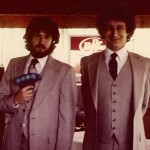
David Finkel, right, with friend David Klein. So 1970s.
I’ve known David Finkel at every stage of his career — from when we were on the University of Florida student newspaper together, to when we were first learning to write feature stories together at the Tallahassee Democrat, and later at the Washington Post, where Finkel preceded me at the magazine and went on to win a Pulitzer Prize for explanatory journalism. On a personal, one to one basis, he’s always been one of the funniest people I’ve known, funnier face-to-face than Dave Barry or Gene Weingarten. He’s sarcastic, self-deprecatory, even kind of goofy at times. At the earliest stages of his career, I thought he’d more likely be a humor writer than a serious journalist.
Wrong again.
Finkel had astonishing depth and an immense reservoir of talent I barely guessed at. He’s become one of the great non-fiction stylists of our generation — and his style is based on prodigious powers of observation and an almost godlike ability to see, and show us, how the smallest detail can contain the universe.
It’s one of the mysteries of journalism that it’s taken Finkel until now to publish his first book — a fact with which Finkel has made himself the butt of thousands of his own jokes over the years. But now the book is out, and you better stand back.
It’s called The Good Soldiers, and it’s a worm’s eye view of the proverbial “boots on the ground” of American soldiers deployed to Iraq — a worm with the eyes of a poet, it’s that up-close and that profound.
Next Post: Deconstructing Finkel’s opening paragraph.